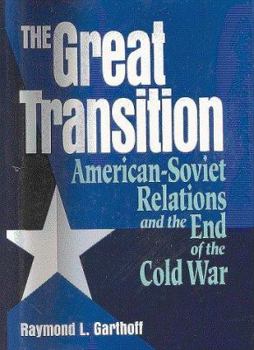The Great Transition: American-Soviet Relations and the End of the Cold War
Select Format
Select Condition 
Book Overview
This volume features a detailed examination of the perspectives and actions of both the United States and the Soviet Union and their interactions, including the inter-relationships of domestic factors... This description may be from another edition of this product.
Format:Paperback
Language:English
ISBN:0815730594
ISBN13:9780815730590
Release Date:January 1994
Publisher:Brookings Institution Press
Length:848 Pages
Weight:0.18 lbs.
Dimensions:1.4" x 6.5" x 9.2"
Customer Reviews
1 rating
Dense But Very Worthwhile
Published by Thriftbooks.com User , 19 years ago
This is a detailed and carefully documented history of American-Soviet relations during the Reagan and Bush administrations. As such, it covers the period of relative confrontation during Reagan's first term, the re-emergence of a form of detente during his second term, and the expansion of detente under Bush 1 into a form of cooperation with the Soviets in ending the Cold War. Written clearly and organized well, this is a fairly dense read because of the level of detail and documentation. It is also quite long at 800 pages. The organization of the book is interesting. The first 500 pages are a detailed, chronogically ordered account of Soviet-American relations. The remaining 300 pages are a series of more topically oriented chapters beginning with an summary/analytic chapter on Soviet-American relations during this period. Chapters on European-American-Soviet diplomacy, Asian-Soviet-American relations, and American-Soviet competition in the 3rd world follow, with a concluding chapter that gives an overview of the Cold War. This is an outstanding work. The author's background is unusual. Garthoff was a career diplomat specializing in Soviet and Eastern European affairs who became a scholar after retiring from the Foreign Service. Garthoff brought long personal experience with diplomacy as well as considerable analytic intelligence to this task and the book reflects a tempered and critical approach to a number of contentious issues. Garthoff's analysis of the Reagan administration is rather critical. While he employs moderate language, he faults the Reagan era policy makers for being unduly alarmist and unecessarily confrontational. He makes a very good case that Reagan's policies towards the Soviet Union were much less consistent than is commonly thought. He shows also that the Reagan administration was internally divided on important issues and that this reduced policy coherence. Reagan himself comes off as well intentioned but frequently out of touch and perhaps even willfully ignorant. Garthoff's most negative comments are directed, though the quality of his language remains neutral at all times, towards the more conservative ideologues with the Reagan administration, particularly those with positions at the Pentagon. Garthoff's depiction of the Soviet leadership during Reagan's first term, whose personnel changed considerably as aged leaders died in serial order, is somewhat surprising. Despite the changes in leadership, Soviet policy makers were in several ways more consistent than the Americans and in a diplomatic context, even somewhat more moderate. Despite oscillations in American policy, the Soviet leadership continued to seek accomodation in important areas like arms control and had a relatively moderate response to the American increases in defense budgets, which they (and others, for example, many European governments) found threatening. Policy realities eventually forced the Reagan administration to embark on




